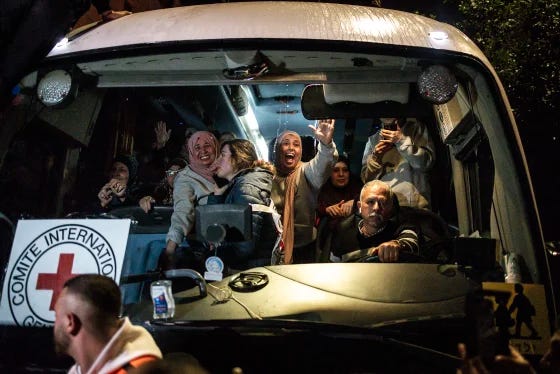Palestinians Celebrate the Release of 90 Prisoners and Detainees as Ceasefire Deal Begins
Families gather in joy as the first phase of a ceasefire agreement brings the release of 90 Palestinian prisoners, including women, children, and activists.
BEITUNIA, West Bank — A wave of emotion swept through Palestinian families as 90 women and children were released from Israeli custody as part of the first phase of a ceasefire agreement between Israel and Hamas. The release, which took place just after midnight on Monday, was met with loud cheers, tears, and celebrations as loved ones greeted the detainees outside Ofer Prison in the occupied West Bank.
As families waited in the cold, the streets filled with a festive atmosphere, with people sharing food, selling cotton candy, and waving flags in support of Hamas. Children carrying balloons lit up with fairy lights played nearby, while men gathered around a fire to sing and celebrate the long-awaited reunions.
Among the freed were Boshara Amro, 21, whose sister Jeneen Amro was released. Boshara shared her joy with NBC News, saying her emotions were "indescribable." "She’s my big sister," Boshara explained, describing Jeneen as a second mother. Although Boshara had been unable to visit her sister during her detention, she expressed concern over the severe physical and mental toll Jeneen had endured.
Jeneen Amro had been detained without clear explanation by Israeli forces in the West Bank, and her family was not informed of the charges against her. The Israeli military and prison authorities have not responded to questions about her arrest.
The youngest detainee released was 15-year-old Mahmoud Aliowat, who was among those freed after an unspecified period of detention. Another notable figure released was Khalida Jarrar, 62, a prominent member of the Popular Front for the Liberation of Palestine (PFLP). Jarrar had been held in administrative detention since late 2023, a practice where detainees are imprisoned without trial or charge based on undisclosed evidence. Rights organizations have criticized her detention as politically motivated.
Jarrar’s release was met with visible support, as several people helped her walk through the cheering crowd. On social media, many remarked on the graying of her hair, noting the toll of her prolonged imprisonment.
Among the other prisoners freed was Dalal Khaseeb, 53, the sister of Saleh Arouri, a former Hamas commander killed in January. Her son Muhammad shared that she had been detained about a year ago.
The release of these prisoners marks the first phase of a three-part ceasefire agreement announced on Wednesday. Under the deal, 33 hostages from Gaza will be released in the coming weeks, and approximately 2,000 Palestinian prisoners will be freed in exchange for a pause in fighting, increased aid deliveries to Gaza, and other terms.
The deal specifies that over 1,100 detainees held in Gaza during the war, but not involved in the October 7 attacks, will also be released. While the Israel Prison Service has labeled all 90 detainees as "terrorists," it has yet to clarify the specific charges against them.
The future of the ceasefire remains uncertain as the second phase of the agreement is set to begin. It includes more hostages and prisoner releases and aims for a permanent cessation of hostilities that erupted after the October 7 Hamas attack, which killed over 1,200 Israelis and took around 250 hostages. Since then, more than 46,800 people have died in Gaza amid Israel’s 15-month military operation.
Ahead of the second phase of the ceasefire, the Israeli military has announced increased operations in the West Bank, focusing on key routes and new checkpoints to prevent violent activities and "terrorist" actions. The heightened presence of Israeli forces has raised concerns among Palestinians, especially as settler violence in the West Bank has escalated during the Gaza conflict.
The ceasefire’s success and the future of peace in the region depend on the continued release of prisoners and the easing of tensions on both sides of the Israeli-Palestinian conflict.


